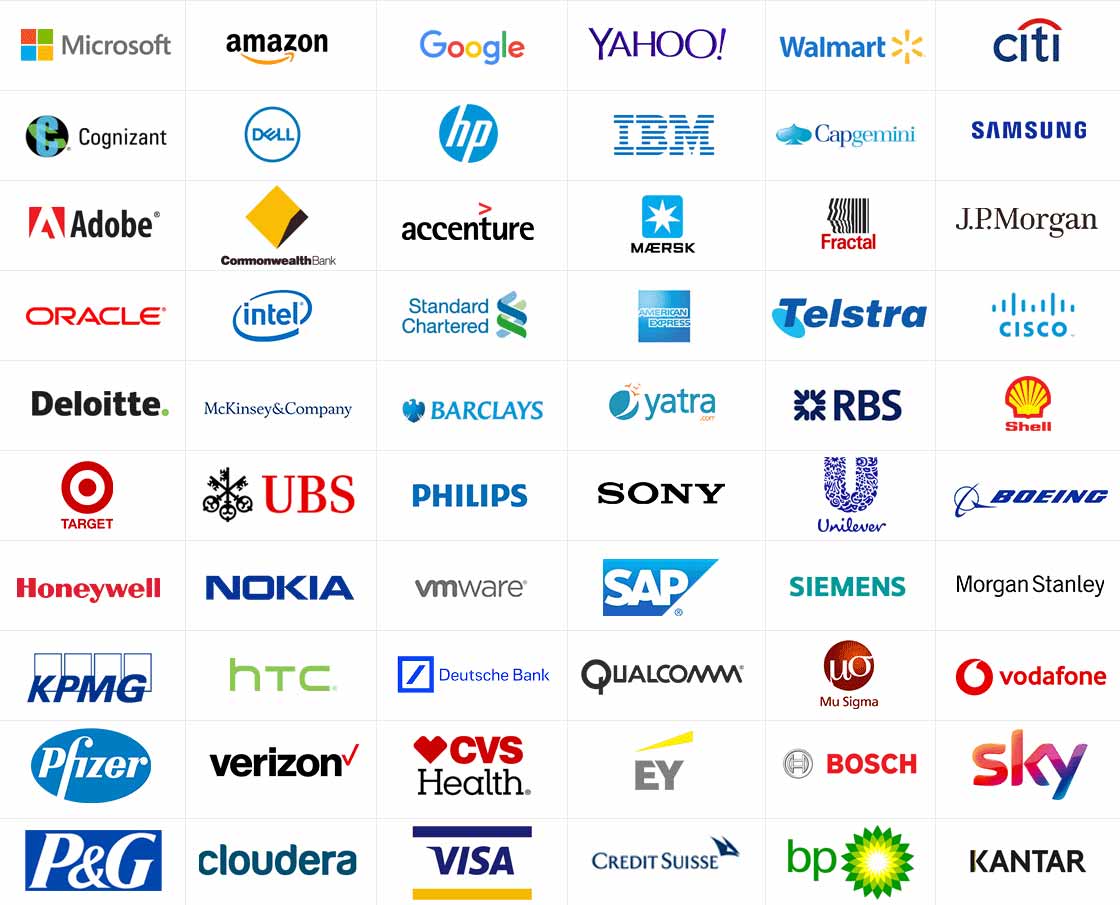
Post-Graduate Program in Data Science & Business Analytics
Advance your career with Data Science
With On-Campus Immersion in Decision Science and AI (Optional Paid Program)
- 6 Months Program
- Online Learning with Mentorship
 On-Campus Immersion in Decision Science and AI (Optional Paid Program)
On-Campus Immersion in Decision Science and AI (Optional Paid Program)
97%
Program Satisfaction

4.8/5
Trustpilot

4.81/5
Course Report
Thousands of Careers Transformed

Lakshmi Panchagnula
Water Programs Specialist
The program is a great introduction to programming and model building even for those without any background in coding.


Gabriel Arbe
Director of Operations, Latin America
Perfect combination of relevant content, flexibility, academic rigor, and practical content that allowed me to immediately put all into practice at work.
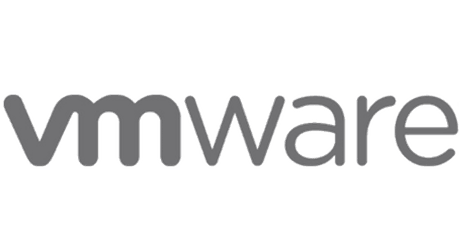

Aparna Bharath Kumar
Data Analyst
Great learning experience and would definitely recommend it to anyone who is looking for a perfect program.


Kati Laev
Customer Service Administrator
Gave me the confidence that I am at the same knowledge level in this course as those who have been working as a data scientist for years.
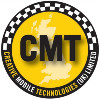

Osama Salem
Senior Application Manager
The course of DSBA helped me gain the skills, which I can use at my work.


Ndohnwi A Moma
Senior Consultant - Project Delivery Specialist
Was able to gain in depth knowledge even with no knowledge or experience in DSBA


Renato Barroco
Research Analyst / Independent Trader
The course helped me by giving a peek into whether I can make a move from Finance to Data Science


Sudarshan Murali
Senior Business Analyst Lead
This program helped me gain the right mix of technical and fundamental skills to be better at my role.


Naeem Sufi
Senior Webfocus Developer
I would recommend it to anyone interested in upgrading their skillset or starting a new career.

Get Industry ready with Career Support

1:1 Industry Interactions

Resume & Linkedin Profile Review

Interview Preparations & Demos

Online Portfolio Assessment
Why Choose Our Data Science Program
Global collaborations with peers
Meet other data science learners through micro classes and grow your professional network.
VIEW BATCH PROFILE
Weekend online mentorship by experts
Get assistance on 7 industry-relevant projects through weekend sessions with a certified industry professional.
VIEW EXPERIENCE
Program Support
We help you stay motivated. Get personalised academic and non-academic support during the program.

Industry-relevant Projects & Skills
Learn in-depth Python, Machine Learning, Data Visualization and Ensemble Techniques.
VIEW CURRICULUM
Transform your career with Data Science and Business Analytics
Certificate from the University of Texas at Austin
Showcase your Certificate of completion from the University of Texas at Austin in your resume

#3 MS - Business Analytics, by QS World University rankings, 2022
#6 Executive Education - Custom Programs, Financial Times, 2022
For any feedback & queries regarding the program, please reach out to us at MSB-DSBA@mccombs.utexas.edu
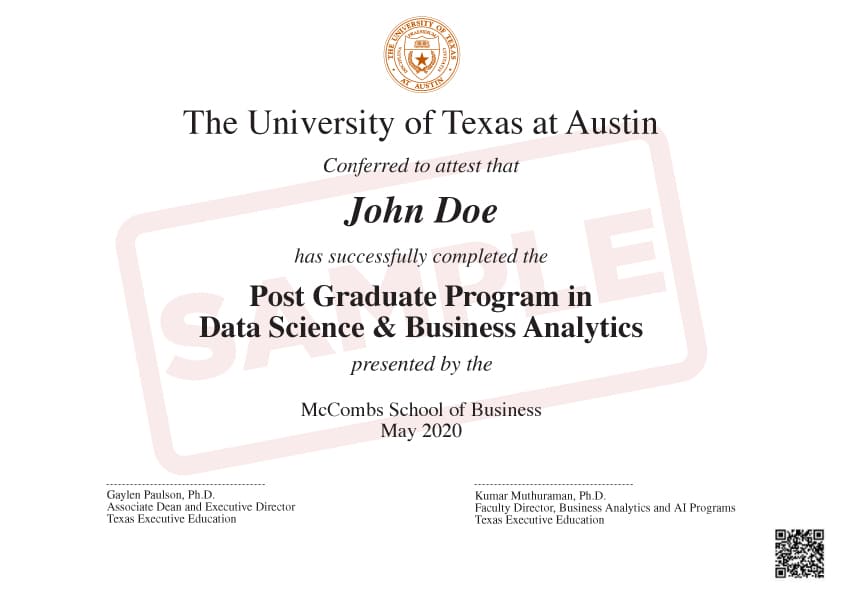
#3
MS - Business Analytics

QS World University Rankings, 2022
#6
Executive Education - Custom Programs

Financial Times,
2022
Elevate Your Skills with On-Campus Immersion (Optional Paid Program)

Decision Science and AI Program
In the 3-day immersive on-campus program you can:
-

Connect with like-minded AI professionals.
-

Immerse in On-Campus Learning for 3 Days
-

Learn Leadership Skills
-

Create Intelligent Decision Science Systems
Reach out to your Program Advisor for more details
Comprehensive Curriculum
The curriculum has been designed by the faculty at McCombs School of Business at the University of Texas at Austin.
225+ hrs
Learning content
9+
Languages & Tools
The ‘Foundations’ module will empower you with the fundamentals of statistics, Python, and domain-specific business knowledge to set the foundations on which the rest of the course will be built. Every concept taught in this module will help you build a strong foundation that will stay with you forever. This is a light warm-up to the world of Data Science. By the end of this foundation course, you will be comfortable talking about Data Science terms.
- Basics of Programming
You will be introduced to programming concepts in this module. Programming is a set of instructions to a computer to perform specific tasks. - Introduction to Python
In this module, you will be introduced to the Python programming language and its fundamentals like syntax.
This module will teach some prerequisites before starting with the Data Science and Business Analytics online course like Programming concepts and Python.
 8 Case Studies
8 Case Studies
- Python Programming
- Python for Data Science
- Python for Visualization
- Exploratory Data Analysis
 8 Case Studies
8 Case Studies
Embark on a data-driven journey with our Python Foundations Module. Learn to read, manipulate, and visualize data using popular Python packages, enabling you to tell compelling stories, solve business problems, and deliver actionable insights with ease.
Grasp the simplicity and readability of Python's syntax as you explore variables, data structures, conditional and looping statements, and functions. Build a robust skill set in Python essentials for effective coding and data organization.
Explore crucial tools in Data Science—NumPy and Pandas. NumPy excels in mathematical computing with arrays and matrices, while Pandas, an open-source library, provides speed and flexibility for data manipulation and analysis. This module deep-dives into these essential libraries, equipping you to adeptly read, manipulate, and derive insights from data in the realm of Data Science.
This module focuses on Matplotlib and Seaborn. Matplotlib, a dynamic library, enables static and animated visualizations, while Seaborn, built on Matplotlib, enhances data visualization in Python. This module provides an in-depth exploration of these tools, empowering you to create impactful visualizations that effectively summarize and communicate insights from diverse datasets.
Explore the depths of Exploratory Data Analysis (EDA), unraveling data patterns and extracting meaningful insights using Python. Acquire the skills to inform strategic business decisions based on the comprehensive analysis of data.
 8 Case Studies
8 Case Studies
- Inferential Statistics Foundations
- Estimation and Hypothesis Testing
- Common Statistical Tests
 8 Case Studies
8 Case Studies
Elevate your analytical skills with the Business Statistics module. Harness the power of Python to assess the reliability of business estimates through confidence intervals and hypothesis testing. Make informed decisions by analyzing data distributions, ensuring precision in resource allocation and strategic commitments.
Delve into the core of statistical analysis. Gain a comprehensive understanding of probability distributions, essential for making statistically-sound, data-driven decisions. Master the fundamentals to draw conclusions about populations based on samples.
Uncover the intricacies of estimation, determining population parameters from sample data, and master the art of hypothesis testing—a framework for drawing meaningful conclusions. Delve into essential concepts like the Central Limit Theorem and Estimation Theory, providing a solid foundation for robust statistical analysis in decision-making.
Gain proficiency in hypothesis tests, essential for validating claims about population parameters in Data Science. This module introduces the most commonly used statistical tests, equipping you to choose the right test for business claims based on contextual nuances. Explore practical implementations in Python through real-world business examples, ensuring a comprehensive understanding of statistical testing in the Data Science realm.
The ‘Techniques’ module in this Data Analytics course will empower you with a thorough grounding in the most widely-used analytics and data science techniques so that you can approach any business problem with ease. By this time you have an overview of what is coming and can begin with mastering each technique.
 4 Case Studies
4 Case Studies
- Intro to Supervised Learning - Linear Regression
- Linear Regression Assumptions and Statistical Inference
 4 Case Studies
4 Case Studies
Uncover the power of linear models in deciphering relationships between variables and continuous outcomes. Validate models, draw statistical inferences, and gain invaluable business insights into the key factors shaping decision-making.
Gain insights into Machine Learning, a subset of Artificial Intelligence, dedicated to pattern recognition and predictive analysis without explicit programming. This module specifically delves into the fundamentals of learning from data, the mechanics of the Linear Regression algorithm, and practical aspects of building and evaluating regression models using Python.
Explore the critical facets of Linear Regression with our module on Assumptions and Statistical Inference. Gain insights into the essential assumptions that validate the model statistically. This module guides participants through understanding, checking, and ensuring the satisfaction of these assumptions. Learn how to address violations and draw meaningful statistical inferences from the model's output, ensuring a robust and reliable application of Linear Regression in data analysis.
 4 Case Studies
4 Case Studies
- Logistic Regression
- Decision Tree
 4 Case Studies
4 Case Studies
Master classification models to discern relationships between variables and categorical outcomes, extracting vital business insights by identifying key decision-making factors.
This module covers the theoretical foundations of Logistic Regression, performance assessment, and the extraction of meaningful statistical inferences. Participants will grasp the intricacies of model interpretation, evaluate classification model performance, and discover the impact of threshold adjustments in Logistic Regression for enhanced predictive accuracy. Explore applications spanning medicine, finance, and manufacturing, ensuring a robust understanding and application of Logistic Regression in diverse fields.
Explore the power of Decision Trees in our module, uncovering their role as supervised ML algorithms for hierarchical decision-making in both classification and regression scenarios. Delve into the intricacies of modeling complex, non-linear data with Decision Trees. This module elucidates the process of building a Decision Tree, introduces various pruning techniques to enhance performance, and provides insights into different impurity measures crucial for decision-making. Acquire a comprehensive understanding of the Decision Tree algorithm, empowering you to navigate its construction and optimization effectively.
 4 Case Studies
4 Case Studies
- Bagging and Random Forest
- Boosting
 4 Case Studies
4 Case Studies
Unlock the potential of Ensemble Techniques in our module. Learn to blend decisions from multiple models, creating robust models for enhanced predictive accuracy. Elevate your ability to make superior predictions through advanced ensemble techniques.
Delve into the intricacies of the Random Forest technique, a powerful ensemble method that amalgamates decision trees to enhance predictive performance. This module provides insights into the workings of ensemble techniques, sampling with replacement, and the fundamental concept of bagging. Participants will gain practical knowledge on constructing and training Random Forest models, empowering them to tackle complex business problems with improved predictive accuracy.
Explore essential boosting algorithms such as Adaboost and XGBoost, widely acclaimed for accurate and robust predictions in various industries. Gain a comprehensive understanding of the boosting concept, discern the distinctions between bagging and boosting, and delve into various boosting algorithms. Additionally, this module introduces the concept of stacking, providing participants with a well-rounded knowledge of advanced ensemble techniques for improved predictive capabilities.
 4 Case Studies
4 Case Studies
- Feature Engineering and Cross Validation
- ML Pipeline and Hyperparameter Tuning
 4 Case Studies
4 Case Studies
Master feature engineering techniques and hyperparameter tuning to not only enhance accuracy but also strategically minimize business costs. Elevate your ability to fine-tune models for optimal results and cost-effectiveness.
Explore techniques to enhance machine learning models, covering the creation and modification of input features for optimal performance. Delve into cross-validation methods to achieve a more precise evaluation of model effectiveness. The module also addresses regularization concepts, providing insights for fine-tuning machine learning models. Acquire practical skills in handling imbalanced data, ensuring a thorough understanding of these pivotal concepts in machine learning.
Discover two effective techniques to optimize hyperparameters for machine learning models, tailored to specific business contexts. Additionally, delve into the creation of ML pipelines, streamlining data processing and modeling for a reproducible and efficient workflow. Acquire practical skills in automating standard machine learning processes, ensuring optimal model performance and efficiency in your data-driven endeavors.
 4 Case Studies
4 Case Studies
- K-Means Clustering
- Hierarchical Clustering and PCA
 4 Case Studies
4 Case Studies
Uncover hidden patterns with our Unsupervised Learning module. Utilize clustering algorithms to group data points based on similarity, revealing intrinsic structures. Gain insights into dimensionality reduction and understand its significance in extracting valuable information from data.
This widely-used ML algorithm identifies patterns in unlabeled data, grouping it effectively. Delve into the inner workings of the K-means clustering algorithm, gaining practical insights for its implementation in real-world scenarios. Learn about various clustering algorithms, understand the nuances of K-means clustering, determine the optimal number of clusters through metric comparison, and appreciate the significance of scaling data for accurate clustering results.
Hierarchical clustering organizes data into nested clusters, revealing intricate patterns, while PCA reduces dimensionality for effective visualization and feature selection. This module explores the business applications of hierarchical clustering, demonstrating its ability to unveil patterns and aid in decision-making. Additionally, learn the significance of dimensionality reduction, grasp the working principles of PCA, and acquire skills in transforming data into fewer dimensions for enhanced analysis and visualization of multivariate datasets.
Explore a variety of real-life challenges in the Self-Paced Domain Exposure module. Learn how to apply data science and analytics principles to solve diverse problems at your own pace, gaining valuable insights and skills tailored to your schedule.
Gain an understanding of the evolution of Data Science over time, their application in industries, the mathematics and statistics behind them, and an overview of the life cycle of building data driven solution.
Gain a fundamental understanding of the basics of Python programming and build a strong foundation of coding to build Data Science applications
Read, explore and effectively visualize data using Tableau and tell stories by analyzing data using Tableau dashboards
 1 Case Study
1 Case Study
 1 Case Study
1 Case Study
Learn how to describe components of a time series data and analyze them using special techniques and methods for time series forecasting.
 1 Case Study
1 Case Study
 1 Case Study
1 Case Study
Understand the role of predictive modeling in influencing customer behavior and how businesses leverage analytics in marketing and retail applications to make data-driven decisions
 1 Case Study
1 Case Study
 1 Case Study
1 Case Study
Develop a deep appreciation of credit and market risk and understand how banks and other financial institutions use predictive analytics for modeling their risk
 1 Case Study
1 Case Study
 1 Case Study
1 Case Study
Understand and appreciate the most widely used tools of web analytics which form the basis for rational and sound online business decisions, and learn how to analyze social media data, including posts, content, and marketing campaigns, to create effective online marketing strategies.
 1 Case Study
1 Case Study
 1 Case Study
1 Case Study
Get exposed to the discipline of supply chain management and its stakeholders, understand the role of logistics in businesses and supply chains, and learn methods of forecasting prices, demand, and indexes
Get an overview of Generative AI, what ChatGPT is and how it works. delve into the business applications of ChatGPT, and an overview of other generative AI models/tools via demonstrations.
The Decision Science and AI is a 3-day on-campus Program that presents a valuable opportunity to explore AI use cases and become a driving force behind AI-driven initiatives within your organization. It comprises of dynamic discussions, collaboration with like-minded professionals, and engaging networking sessions hosted at the prestigious University of Texas at Austin.
- Welcome & Program Orientation
- Introduction to Decision Sciences & AI
- Campus Tour & Group Photo
- Introduction to Dynamic Programming
- Programming an AI agent to Play a Variant of Blackjack
- Introduction to Reinforcement Learning
- Programming an AI Agent that learns by itself to play computer games
- Session with Industry Mentor
- The Art and Science of Negotiations
- Project Brief and Active group work
- Group work on Project
- Certifications and Photo Ops
Languages and Tools covered


Hands-on Projects
Data sets from the industry

1000+
Projects completed
22+
Domains

PYTHON FOUNDATIONS

BUSINESS STATISTICS

SUPERVISED LEARNING FOUNDATIONS

SUPERVISED LEARNING CLASSIFICATIONS

ENSEMBLE TECHNIQUES

MODEL TUNING

UNSUPERVISED LEARNING
Our Faculty and Mentors
Learn from leading academicians in the field of Data Science and Engineering and several experienced industry practitioners from top organisations.
20+
Professors
2500+
Industry Mentors

Dr. Kumar Muthuraman
Faculty Director, Centre for Research and Analytics


Dr. Abhinanda Sarkar
Faculty Director, Great Learning


Prof. Raghavshyam Ramamurthy
Industry Expert in Visualization


Mr. R Vivekanand
Operations Director

Industry Mentors from Top Organisations

Prabhat Bhattarai
Data Scientist


Nikhila Kambalapalli
Consultant, Data Science


Srihari Nagarajan
Senior Data Scientist


Olayinka Fadahunsi
Head of Data Science and Engineering


Anis Sharafoddini
Data Scientist Lead


Avinash Ramyead
Senior Quantitative UX Researcher / Data Scientist / Behavioral Scientist in Video ML


Edward Krueger
Principal Data Scientist and Proprietor


Paolo Esquivel
Senior Data Scientist


Michael Keith
Analytics Manager


Anuj Saini
Principal Data Scientist, RPX Corporation

Mohit Jain
Principal Data Scientist


Yogesh Singh
Founder and CEO, NSArrows

Rushabh Shah
Software Developer, Kyra Solutions
Roshan Santhosh
Data Scientist, Meta
Learner Testimonials
I've done a program before with a different university and I didn't feel there was as much interaction as I would have loved. So I identified a few things, such as mentoring sessions, which you do with an expert from the business and that allows you to interact as if you were on campus.
Aziz Elbahri
Manager, Customer Care Administration, American Airlines (United States)

It's very compact, but at the same time it covers everything with a real-world domain context behind each of the problem statements, and in doing so, they provide you with all the collateral materials to help you in your journey.
Yuedong Lu
Director Client Partnership & Growth, Fractal Analytics (United States)

The advantage of learning it on your own is that you can start and stop. I liked that aspect of it where I could control how I digested the lectures.
Sarah Bittner
Patent Agent, Montgomery McCracken Walker & Rhoads LLP (United States)

The most helpful features of the program are the mentor sessions and the solo projects. It felt like you put everything together and put it in a business case, and that was very helpful for me.
Monica Suarez
Former Founder, Arewa (United States)

My two biggest achievements of my life have been my son and then Great Learning. The program has been amazing and everyone from the program office, faculties to mentors were very supportive and helped me achieve my professional and personal goals.
Shamelle Chotoki
GSI Analyst, Western Union (United States)

This program is a great start for any individual irrespective of your profession or your comfort level in programming. All the video lectures, the mentored learning sessions, the assignments, the projects, everything will give you a lot of confidence to build a career in Data Science.
Indu Chanchal Polpaya
Postdoctoral Research Associate, Lehigh University (United States)

I loved the course because it really just stretched me into a whole new world. I was really happy with my results in the course and that was really thanks to the amazing mentors and lecturers and of course the program management.
Leanne Da Cerca
Senior Group Manager, MTN (South Africa)

What Heena [Program Manager] give us, especially to me, is the support that I didn’t receive from any other online courses. I appreciate the constant messaging and constant checking on us, how’s our progress or any other concerns that we need to raise.
Fermar B Talosig
Senior Associate Engineer, NetLink Trust (Singapore)

If you are interested in learning the Data Science and Business Analytics course in your own time and at your own pace, this is a great program. I recommend this because it is a course which is starting from the basics and then laying brick-by-brick to get to the final data insights.
Sudha Aluri
Shared Information Support Manager, Freddie Mac (United States)

I like the structure of the program as it combines all the theories, practices and case studies together. This program is highly recommended as it gives you the tools to address problem solving in a efficient manner.
Flor de María Gómez Esparza
Ex-Compensation Leader, Pemex (México)

The way you have been explaining, clearing doubts wherever possible and even encouraging, I must say that you've really done well and I want to say that I celebrate you. Thank you so much for giving your time to teach and help us in this journey.
Moeti Manoto
Service Manager, Openserve (South Africa)

In the hackathon in this program, first thing is, I have learned speed. From the same dataset different models, trying that was a new thing.
Sruthi Boojala
Software Engineer, TEKsystems Global Services India Pvt. Ltd (Singapore)

The most important thing what I thought from this program is this is a very good combination of Data Science and Business Analytics. Every week we will be having a quiz, based on the topic that we covered, which is a rigorous learning process. So this actually is very helpful to learn and get in touch.
Mohammad Tahmid Bari
Data Analyst II, Expeditors Singapore Pte Ltd. (Bangladesh)

It was a pleasure to deal with all of you, right from the coordinators to the mentors. Special thanks to the doctors who have given valued information about Data Science and Business Analytics.
Mohamed Shafik Sabry
Solution Architect, GBM - IBM (United Arab Emirates)

Thank you for how you tried to impart knowledge to us. Thank you for all the time you spend, the resources, the efforts you put into ensuring we have a full grasp of everything you pass across to us, you are truly appreciated.
Seun Lawal Anako
Senior Manager, Business Compliance, American Tower Company (Nigeria)
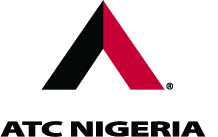
It's quite interesting because I can see my performance and also other's performances. The competition is some kind of motivation for me to work better and to see whether I can beat the others.
Low Yu Ning
Product Engineer, Micron Semiconductor (Singapore)

It's quite motivating to see the name on the leaderboard in the hackathon. Don't try to think too much about the model, think about the data. Data cleanup and understanding the data is the most important thing.
Sharat Kishore
Training & Development- Technical Instructor, Schlumberger (UAE)

Learner Feedback on Mentorship and PM Support
I enrolled in the Post Graduate Program in Data Science and Business Analytics following a layoff from my previous job. I enrolled in this program to pivot my career path and enhance my skills. With 17 years of experience as a GIS Analyst, I sought to integrate Python scripting for automation in GIS work. Despite time constraints, I completed the program and am grateful for the knowledge I gained. I'm now applying these skills in my role as a GIS analyst at an engineering firm, making my work more impactful. Special thanks to my Project Managers for their support. I highly recommend this program to anyone aiming to strengthen Python scripting and data analysis skills.
READ MOREThe journey with Great Learning has been a roller coaster ride. Especially because it was the pandemic period and everyone was connected virtually. There were times where I was eager to learn more and submit assignments way before the deadline, and there were times where I had stretched the assignments till the last minute. But, I always had something new to learn and it kept building my confidence. It also increased my love for data analysis. The program and modules were well-structured and so were the assignments and module-wise projects. It helped me with my technical skills and analytical abilities. I joined this program because I wanted to get a glimpse of data analysis and see if I could switch to this domain. And this program has pushed me to take a major step in this direction.
READ MOREI am an Electronics Engineering graduate and I am currently working as a Data Analyst in Ola Financial Services Pvt. Ltd. I was stuck in a support role for a long time and wanted to get out of it. I was planning on getting a PG program from a reputed organisation which could help me build foundational skills in Data Science and Business Analytics and support me with career transition. That's when I joined this program. The video lectures delivered by the SMEs gave us foundational knowledge. The mentoring sessions helped me clear my doubts and the hands-on projects familiarised me with problem solving. The industry sessions were simply the cherry on the cake.
READ MOREIt was a great experience. The way faculty teach concepts from scratch was excellent. I started this program with a blank mind but when the faculty members started teaching, I learned various Data Science concepts thoroughly. They connect every concept with real-life examples. Though I was new to the domain, I gained complete understanding of the key skills. I would rate this program five stars.
READ MOREIt was an intensive one-year program filled with exciting new concepts and knowledge, marking a significant shift in my career. Throughout this learning period, I completed 7 real-time projects, transforming from a student to a Data Scientist capable of providing valuable solutions. I want to express my heartfelt thanks to our mentor and Program Manager for their invaluable guidance. I also appreciate the support of my wonderful classmates. With this new qualification and career path, I'm ready to provide data-driven solutions for both business and personal needs.
READ MOREFrom mentorship by industry experts to top-class learning material and challenging projects, the programs are planned so well that no student would have a problem understanding key concepts. The hands-on practice with technologies and skills learned through projects is what helped me grasp concepts. I would like to thank Great Learning for a wonderful experience and would urge professionals who are looking for a career change to upskill with them.
READ MOREThe program has exceeded my expectations, offering a comprehensive and well-structured approach to Data Science and Machine Learning. The step-by-step learning process, from basic to complex topics, and the knowledgeable academic support team have been particularly beneficial. Constant assistance from the Program Manager has also been helpful.
READ MOREMy experience with Great Learning was amazing. I come from a non-technical background but because of this program, I learned how to build linear regression models. I now understand the impact this type of tool has on practical applications. This program has given me an advantage in the workplace. I believe that I will be ahead of the curve when it comes to offering solutions to complex business problems. It has helped me build a strong foundation in Data Processing, constructing algorithms and using Python.
READ MOREI found an opportunity to develop my foundations in Data Science when I joined this program. The instructors were excellent, and the assignments were well thought out too. The program’s outstanding delivery format allowed me to complete it on time. I strongly recommend the program to someone who is beginning a career in this domain.
READ MOREStarting the year by upskilling myself, I'm thrilled to share that I've completed the Post Graduate Program in Data Science & Business Analytics. In this digital era, where data reigns supreme, I found nothing more thrilling than understanding, analyzing, and deriving insights from vast amounts of data. Balancing work, family, and study was challenging, but completing the program with a GPA of 4.28 was worth it. Heartfelt thanks to the supportive family and gratitude to our Program Manager.
READ MOREIt was an amazing experience. I learned a lot. Davanshi was amazing supporting and cheering me through the process. She helped a lot with the structure of the program. I like the way this business analytics program is set up. The lectures and videos were very nicely explained. They made it look simple with logic that helped me digest the content. Thanks a lot!
READ MOREI acquired proficiency in data science and Python through a comprehensive self-learning journey. The course provided exceptional study materials and recorded lectures, maintaining consistently high standards throughout. I would like to express my gratitude to the program manager for their diligent follow-ups, ensuring that all projects and assignments were submitted promptly. Thank you.
READ MOREThe data science course is well designed, It helps us clear the fundamentals and has extensive problem statements to solve. It would be great to see more industry/real life implemented applications and cases ML and Data science projects.
READ MOREThis program has been great. I had no experience at all with python or any other programming language; now I am able to manipulate data using python and draw insight from it.
READ MOREThis data science program is exactly what l needed in order to move forward in my career. The content is very good for who need to transition into a new career and the hands-on projects are geared toward making one feel how real world projects are like.
READ MOREProgram Fees
Program Fees:
4,200 USD
Upfront Payment & Referral
4,000 USD
4,000 USD
Payment Partners




*Subject to partner approval based on regions & eligibility. dLocal for Brazil, Colombia & Mexico learners. Other partners for U.S. learners only.
Benefits of learning from us
- High-quality content
- 7 hands-on projects
- Live mentored learning in micro classes
- Doubt solving by industry experts
- Flexible learning approach
- Career support services
I'm extremely glad I signed up for the program. I definitely got what I wanted from the program and strongly recommend it.

Javier R. Olaechea
Data Solution Integration Advisor ExxonMobil
Plans Full fee
payment plan
Monthly Installment
| Installments | Starts at |
|---|---|
| 6 months | 634 USD/month |
| 12 months | 317 USD/month |
Total Fee Payment
3800 USD
Application Process
Fill the application form
Apply by filling a simple online application form.
Interview Process
Go through a screening call with the Admission Director’s office.
Join program
An offer letter will be rolled out to the select few candidates. Secure your seat by paying the admission fee.
Upcoming Application Deadline
Admissions are closed once the requisite number of participants enroll for the upcoming cohort . Apply early to secure your seat.
Deadline: 4th Jul 2024
Apply Now
Reach out to us
We hope you had a good experience with us. If you haven’t received a satisfactory response to your queries or have any other issue to address, please email us at
help@mygreatlearning.comBatch Start Dates
USA & Canada
To be announced
All other regions
To be announced
Frequently Asked Questions
- Personalised mentored learning in small groups of up to 15 learners
- Covers industry-relevant topics in depth, with hands-on applications and case studies
- Provides hands-on exposure to tools such as Python, Tableau and Advanced Excel. Datasets are also provided
- Experiential learning projects at the end of every module enable candidates to apply their learning to real-world business problems
- Interactive live sessions with industry experts and mentors provide current industry knowledge and insights
- The online delivery model makes it convenient for working professionals to pace their learning and get doubts cleared without having to quit their jobs or travel anywhere
The PGP-DSBA curriculum has been designed in collaboration with UT Austin. The teaching and content in the program is by faculty from UT Austin, Great Learning and other practicing data scientists and analytics experts. The capstone projects are approved by UT Austin Faculty.
Upon successful completion, participants earn a certificate of completion from The University of Texas at Austin.
Participants are guided through a unique mentored learning process that happens in a micro-class of 20-22 learners, and guided by a senior industry mentor. These are live sessions with two-way audio and video interaction and take place on weekends.
The primary objective of the program is to help you prepare for a career in the domain. Understanding the importance of gaining credibility, knowledge, and a body of work in landing you a job, we have worked backwards to design a program that helps you stand out on all 4 fronts.
- The certificate from UT Austin serves to give you credibility and recognition in the global industry.
- Best-in-class recorded content from UT Austin faculty and hands-on practical training equip you with the knowledge to succeed.
- The projects you complete add on to your body of work to prepare an industry-ready portfolio by the end of the program.
- Interacting with established practitioners and other aspiring data science professionals helps you build your network.
In addition, the program provides career guidance sessions with industry practitioners and mentoring/support on the softer aspects of job hunting such as resume review, LinkedIn profile review, interview preparation, etc.
Yes. The program is covered using recorded content delivered by academic and industry faculty and live instructor-led online micro-classes which happens in a group of 20-22 learners. All assessments will also be conducted online.
Candidates can access all the necessary learning material online through the Learning Management System.
Participants do several experiential projects on Time series forecasting, Predictive modeling, Advanced statistics, Estimation & Hypothesis testing, and Data mining, which requires candidates to use and apply the concepts learned across all the different modules in these projects.
- Python
- Tableau
The McCombs School of Business at the University of Texas at Austin is ranked No. 6 in the world by QS Business Analytics Ranking, 2021.
The projects include real-world projects and case studies. You'll work on data analysis, predictive modelling, machine learning, and more, utilizing tools like Python, R, and Tableau, providing a practical understanding of the concepts.
Yes. This program is often considered one of the best Business Analyst courses for those looking to change or advance their careers. Its comprehensive curriculum, industry-aligned projects, and connection with top-tier faculty make it suitable for those new to the field or seeking to upgrade their existing skills.
Graduates of this course can explore career opportunities in various domains such as finance, healthcare, retail, technology, and more. Typical roles include Data Analyst, Business Analyst, Data Scientist, and Business Intelligence Specialist. The program's strong reputation and industry connections significantly enhance job prospects.
Yes. Participants will have the opportunity to interact with UT Austin faculty. Regular classes, Q&A sessions, and one-on-one mentorship opportunities ensure an engaging learning experience.
The business analyst course combines online sessions, tutorials, hands-on projects, mentorship from industry experts, and career support. This blended approach ensures both theoretical understanding and practical application of data science and business analytics skills. In addition, there is an optional 6-week module that covers Microsoft Power BI, where learners can master the tool for data analysis.
A business analyst course is a structured educational program designed to teach individuals the skills, knowledge, and techniques required to become effective business analysts. These courses focus on various aspects of business analysis, including requirements gathering, process modelling, data analysis, and communication with stakeholders. Participants learn how to identify business needs, analyze and interpret data, and propose solutions to improve the efficiency and effectiveness of business operations.
The curriculum typically covers topics such as:
-
Introduction to business analysis: This includes understanding the role and responsibilities of a business analyst, as well as the importance of business analysis in organizations.
-
Requirements elicitation and management: Participants learn various techniques for gathering, documenting, and validating business requirements from stakeholders.
-
Business process modelling: This involves the use of diagrams and flowcharts to represent and analyze business processes, identifying areas for improvement.
-
Data analysis and interpretation: Students learn to analyze and interpret data using tools and techniques such as spreadsheets, databases, and data visualization software.
-
Solution evaluation and validation: This includes assessing the feasibility and effectiveness of proposed solutions, as well as validating them against the original requirements.
-
Communication and stakeholder management: Participants develop the ability to effectively communicate with various stakeholders, including managers, team members, and clients.
-
Tools and techniques: Students are exposed to different business analysis tools and methodologies, such as SWOT analysis, PESTLE analysis, and Agile methodologies.
Business analyst courses can be found in various formats, such as online or in-person classes, part-time or full-time programs, and short-term workshops or long-term certification courses.
Each week involves around 2-3 hours of recorded lectures and an additional 2-hour mentored learning session each weekend, which includes hands-on practical applications and problem-solving. The program also involves around an hour of practice exercises or assessments each week. Additionally, based on your background, you should expect to invest 2 to 4 hours every week in self-study and practice. So, that amounts to a time commitment of 8-10 hours per week.
The Post Graduate Program in Data Science and Business Analytics is an online professional certificate program offered by the McCombs School of Business in collaboration with Great Learning. You will receive the grade sheet post-completion; however, the program does not carry any credits. Also, your performance will be assessed through individual assessments and module completion to determine your eligibility for the certificate.
Upon completing all the modules in accordance with the qualifying requirements for the program, you'll receive a certificate from the University of Texas at Austin.
PGP-DSBA is mostly pursued by working professionals planning to make a career transition into analytics roles. We also have students in their final year of graduation benefiting from the program. Graduation in a quantitative discipline like engineering, mathematics, sciences, statistics, economics, etc, would help participants get the most out of PGP-DSBA program.
Data has become highly influential. Data is the future. The domain of Data Science is already observed to create wonders for most of the industries it is being applied to. Data Scientists are creating a significant impact and are causing a great revolution.
The scope of Data Science is far-reaching. The demand and need for data scientists are increasing exponentially as days pass by. This demand is rising at a rapid pace and is expected to grow even more in the future. Hence many professionals are seeking a career transition into the field of Data Science.
Business Analytics is another exciting technological domain that has gained utmost popularity in recent times. Business Analytics and Data Science are employed together for the best outcomes.
The technologies of Data Science And Business Analytics are also believed to take over most of the existing job roles. Hence to build a secured career taking up a data science and business analytics course has become a reliable choice. The applications of data science are delivering the most accurate and reliable results. Data Science and business analytics are also applied in solving most complex business problems.
The applications of Data Science are already being applied to many fields such as gaming, robotics, healthcare, marketing, finance, and more. Data Science and Business Analytics are assumed to extend their territories to several other fields and build new dynamics.
These domains also offer one of the highest-paid job roles across the globe. Hence, choose the best data science and Business analytics certificate courses to fit into the best job roles of the 21st century.
The job opportunities in this field are captivating, attracting both young professionals and career changers to pursue a career as Data Scientists or Business Analysts. Online courses in Data Science and Business Analytics have become popular among those seeking to upskill and enter this rapidly growing industry.
Let us look into a few of the major job positions of Data Science and Business Analytics.
1. Data Analyst
2. Data Architect
3. Statistician
4. Business Analyst
5. Database Administrator
6. Data Engineer
7. Data Scientist
Pursuing a data science and analytics course would aid you get into one of the above-mentioned job roles.
Many believe that Data Science and Business Analytics are the same. Many also use these terms interchangeably. Below are a few differences between Data Science and Business Analytics. These two domains when combined together perform wonders. Hence many are desiring to pursue a Data Science and Business Analytics online course.
- Data Science is the fundamental application of various machine learning methods and ideas to derive significant insights from raw data while Business analytics deals with the collection of data and evaluates the collected data towards accomplishing the business goals.
- Data Science focuses on problem-solving whereas Business Analytics focuses on decision making.
- Data Scientists strives to find the reason for driving those trends and Business Analysts aims to discover the trends of the data
- Data Science applies a lot of coding practices while Business Analytics does not demand programming skills.
- Data Science implements algorithms, statistics to derive insights from data and Business analytics employs the statistical analysis of structured data.
- The ultimate agenda of Data Science is to pose questions and understand the analyzed collected data whereas Business Analytics renders reliable solutions to specific business problems.
Learn more about these technologies by taking up a data Science and business analyst course online.
Data analytics is another interesting domain that is driving interest in many to pursue data analytics courses. Data Science and Data Analytics are two different terms as well as domains that are often referred to as one. Nevertheless, there exists a lot of differences between these two terms. If you are keen about pursuing a data analytics course, it is crucial to learn the differences between Data Science and Data Analytics.
Below are the differences between Data Science and Data Analytics.
- Data Science is the integral application of several machine learning techniques and concepts to extract meaningful insights from raw data and Data Analytics refers to the analysis and classification of the patterns of the information collected to derive the best conclusions that aids in meeting business goals.
- Data science detects patterns in the existing data while Data Analytics is used to sort data to fulfill the organizational needs.
- Data Science has a macro-level scope. However, the scope of Data Analytics is micro.
- The ultimate agenda of Data Science is to ask questions whereas Data Analytics aims to find the perfect and actionable data.
- Data Science focuses on problem-solving while Data Analytics concentrates on decision making
- Data Science exercises Mathematics, Statistics, and Programming Skills. But, Data Analytics applies qualitative and quantitative techniques.
- Data science is implemented in technological domains such as Artificial Intelligence, Machine Learning, and many more while Data analytics is applied in e-commerce, gaming, and other sectors to resolve the issues associated with data.
- Data Science predicts the future whereas Data Analytics provides a day-to-day analysis of the data.
The domain of Data Science is applied in many industries.The applications of Data Science and Business Analytics are not limited to the IT sector. Hence, many are seeking the best business analytics courses online to get into the most exciting job roles. We all are witnessing the hand of data science which we never knew.
Below are a few of the applications of Data Science and Business Analytics offered to different domains
1. Internet Search
Data Science and Business Analytics plays a vital role in displaying the most accurate results for internet search queries. Data Science is an integral technology used by most search engines such as google, bing, opera, and more.
2.Speech Recognition
One of the applications of Data Science is speech recognition. Data Science and Business Analytics are employed to understand the voice notes and produce accurate outcomes. Siri, Alexa, Google voice assistant, and more are a few examples that exercise data science to regulate speech recognition services.
3. Targeted Advertising
Data Science promotes target advertising. Data science algorithms are rapidly employed in digital marketing to identify the target audience and advertise accordingly. Data Science and Business Analytics plays a major role in increasing the CTR( call through rate). These targets are made by studying the user's past behavior patterns.
4. Recommendations
Data Science is employed to make the best recommendations of the products and services of the e commerce websites. Amazon, Flipkart, Spotify, Netflix, and more employ data science to show the best recommendations to its users. This enhances the user's experience as they encounter a personalized shopping experience.
Out of the many, below are a few attributes of Data Science that make it the best technological domain to work for.
1. Data Science and Business Analytics are high in demand
Data Science and Business Analytics are the two domains which have got a great demand. Even as many industries are adapting Data Science and Business Analytics at a rapid pace, there is a significant rise in demand for these technologies.
2. Offers highest-paid career roles
The job roles offered in these domains are considered highly prestigious. These job roles are also observed to be one of the highest-paid ones across the country and abroad.
3. A huge scope
Data Science and Business Analytics are technologies that are not limited to the IT sector. Data Science and Business Analytics have been embraced by most industries such as Healthcare, Gaming, Social Media, Digital Marketing, Agriculture, and many more.
4. The most secure domains.
Even as we live in a world where technological upgrades happen every single day, Data Science and Business Analytics offers secured job roles. Data Science and Business Analytics are expected to take over many of the existing job roles. Hence it is crucial to consider a career that stands tall and secured. Data Science and Business Analytics are surely the domains that offer the most secured job roles.
There are a lot of industries that are already employing Data Science and Business Analytics for the unbelievable benefits they offer. The list of the industries/ domains adapting Data Science and Business Analytics is increasing rapidly. Considering this, the demand for Data Science and Business Analyst online courses is increasing day by day as many are aspiring to get into these job roles.
Business
Data Science and Business Analytics are employed to derive the best business solutions and solve complex business problems. Data Science and Business Analytics are rapidly being applied in businesses as they are observed to serve great benefits such as predict the most accurate outcomes, assessing business decisions, formulating effective business strategies, leveraging the data, and more.
Agriculture
Data Science and Business Analytics are assisting the farmers by offering them many benefits such as weather prediction, analyzing the soil, pest control, disease detection, recommendation of the best fertilizers, and more.
Gaming Industry
Data Science and Business Analytics are applied in designing games. These technologies are helping the designers in designing the games that keep the user engaged and enthusiastic. The data science algorithms study the user's moves and give a tough competition which makes the game more exciting.
Robotics
Data Science and Business Analytics are employed in designing robots. The tools and techniques of Data Science and Business Analytics are applied to create the most intelligent robots. As Data Science is used in Artificial Intelligence and Machine Learning, it stands in the gap to design many technological innovations.
Apart from the above-mentioned industries, these technologies are also used in many other industries such as E commerce, the financial sector, education, and more.
A data analytics course helps students gather, process, analyze, and understand data to gain insights to help them make better decisions. This course covers various aspects of data analytics, such as predictive modelling, statistical analysis, and data visualization. Data analytics courses commonly cover the following subjects:
-
Data cleaning, managing missing data, and data transformation methods are all part of data exploration and preprocessing.
-
Basics of probability distributions, hypothesis testing, and descriptive and inferential statistics comprise statistical analysis.
-
Data representation in graphs, charts, and other visual forms.
-
Introduction to supervised and unsupervised learning methods, model assessment, and model optimization in machine learning.
Data analytics courses are offered in various forms, such as online or in-person classes, part-time or full-time programs, and short-term workshops or longer certification courses. Upon completion, participants can apply these skills across various industries, such as marketing, finance, healthcare, and more.
Please note that submitting the admission fee does constitute enrolling in the program and the below cancellation penalties will be applied:
1) Full refund can only be issued within 48 hours of enrollment
2) Admission Fee - If cancellation is requested after 48 hours of enrollment, the admission fee will not be refunded.
3) Fee paid in excess of the admission fee:
-
Refund or dropout requests requested more than 4 weeks before the Commencement Date are eligible for a full refund of the amount paid in excess of the admission fee
-
Refund or dropout requests requested more than 2 weeks before the Commencement Date are eligible for a 75% refund of the amount paid in excess of the admission fee
-
Refund or dropout requests requested more than 24 hours before the Commencement Date are eligible for a 50% refund of the amount paid in excess of the admission fee
-
Requests received after the Commencement Date are not eligible for a refund.
-
Cancellation must be requested in writing to the program office.
Related Programs for you
Still have queries? Contact Us
Please fill in the form and an expert from the admissions office will call you in the next 4 working hours. You can also reach out to us at dsba.utaustin@mygreatlearning.com or +1 512 793 9938
Download Brochure
Check out the program and fee details in our brochure
Oops!! Something went wrong, Please try again.
We are allocating a suitable domain expert to help you out with your queries. Expect to receive a call in the next 4 hours.
Not able to view the brochure?
View Brochure









